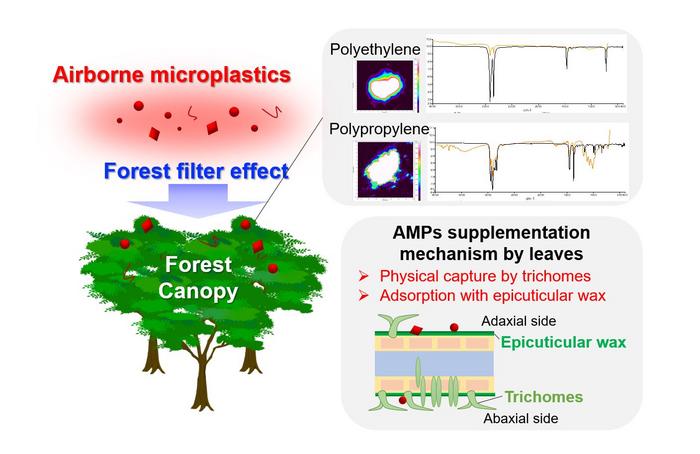A research group led by Japan Women’s University finds that airborne microplastics adsorb to the epicuticular wax on the surface of forest canopy leaves, and that forests may act as terrestrial sinks for airborne microplastics

Credit: None in particular
A research group led by Japan Women’s University finds that airborne microplastics adsorb to the epicuticular wax on the surface of forest canopy leaves, and that forests may act as terrestrial sinks for airborne microplastics
Tokyo, Japan – Think of microplastics, and you might think of the ones accumulating in the world’s oceans. However, they are also filling the sky and the air we breathe. Now, it has been discovered that forests might be acting as a sink for these airborne microplastics, offering humanity yet another crucial service.
In a recently published study, a multi-institutional research group led by Professor Miyazaki Akane of Japan Women’s University has used a new technique to measure the levels of microplastics adhering to the leaves of trees, revealing that forests are potentially acting as terrestrial sinks for these particles.
Microplastics have come into public focus within the last decade because of their effects on the environment and human health. Airborne microplastics are tiny plastic particulates(less than 100 µm) that become suspended in the atmosphere and dispersed throughout the environment, but it has been unclear where they end up. Forests have been known to accumulate airborne pollutants, but their ability to capture airborne microplastics has been poorly understood.
“We investigated airborne microplastics on konara oak tree leaves in a small forest in Tokyo,” says lead author of the study, Natsu Sunaga. “We wanted to determine a reliable method for analyzing levels of these microplastics on leaf surfaces, and how exactly airborne microplastics become trapped by leaves.”
The team examined the leaves of Quercus serrata, a species of oak representative of Japanese forests. To extract the plastics, the leaves were treated using three processes: washing with ultrapure water, simultaneous treatment with ultrasonic waves and washing with ultrapure water, and treatment with an alkaline solution of 10% potassium hydroxide.
“We found that airborne microplastics strongly adsorb to the epicuticular wax on the leaf surface,” explains Akane Miyazaki, senior author. “In other words, these particles accumulate when they stick to the waxy surface coating of leaves.”
The team discovered that the first two treatments – rinsing with ultrapure water alone or in combination with ultrasonic waves – were insufficient for accurately determining the levels of airborne microplastics on forest canopy leaves. Treatment with alkaline potassium hydroxide, however, removed both the epicuticular wax and the substances adhered to it, proving to be an effective method for detecting airborne microplastics stuck to leaf surfaces. Crucially, previous studies that used only the first two methods may have underestimated the number of plastics adhering to leaf surfaces.
“Based on our findings, we estimate that the Quercus serrata forests of Japan (~32,500 km2) trap approximately 420 trillion airborne microplastics per year in their canopies,” states Sunaga. “This indicates that forests may act as terrestrial sinks for airborne microplastics.”
How the accumulation of these microplastics will affect forest ecosystems, including ecosystem functions and soil health, is unknown, and this will undoubtedly be an area of further research. For now, we know that forests and even roadside canopies might reduce the amount of plastic entering our lungs, and for that we have yet another reason to thank trees.
###
Reference
Title of original paper : “Alkaline extraction yields a higher number of microplastics in forest canopy leaves: implication for microplastic storage”
DOI : 10.1007/s10311-024-01725-3
Journal : Environmental Chemistry Letters
Article Publication Date : 20 March 2024
Authors : Natsu Sunaga a, Hiroshi Okochi b, Yasuhiro Niida c, Akane Miyazaki a,*
a Graduate School of Chemical and Biological Sciences, Japan Women’s University
b Graduate School of Creative Science and Engineering, Waseda University
c PerkinElmer Japan G.K.
*Corresponding author. Akane Miyazaki
About Japan Women’s University
Japan Women’s University was founded as Japan’s first organized institution of higher education for women, and celebrates its 120th anniversary in 2021. It is the only private women’s university with a Faculty of science, and is a women’s comprehensive university with an educational environment that integrates the humanities and sciences. The Faculty of Transcultural Studies opened last year, and new faculties are scheduled to open in 2024 (Faculty of Architecture and Design) and 2025 (Faculty of Food Science (tentative name, under planning)). Under the tagline of “I move, and the world opens up,” we are fostering human resources who can learn and act on their own initiative and create new value. For more information, please visit https://www.jwu.ac.jp.
Journal
Environmental Chemistry Letters
DOI
10.1007/s10311-024-01725-3
Subject of Research
Not applicable
Article Title
“Alkaline extraction yields a higher number of microplastics in forest canopy leaves: implication for microplastic storage”
Article Publication Date
20-Mar-2024




